人教新目标版英语九年级全Unit 12 Life is full of the unexpected.Section A 3a-3c课件(27张PPT无素材)
文档属性
| 名称 | 人教新目标版英语九年级全Unit 12 Life is full of the unexpected.Section A 3a-3c课件(27张PPT无素材) | 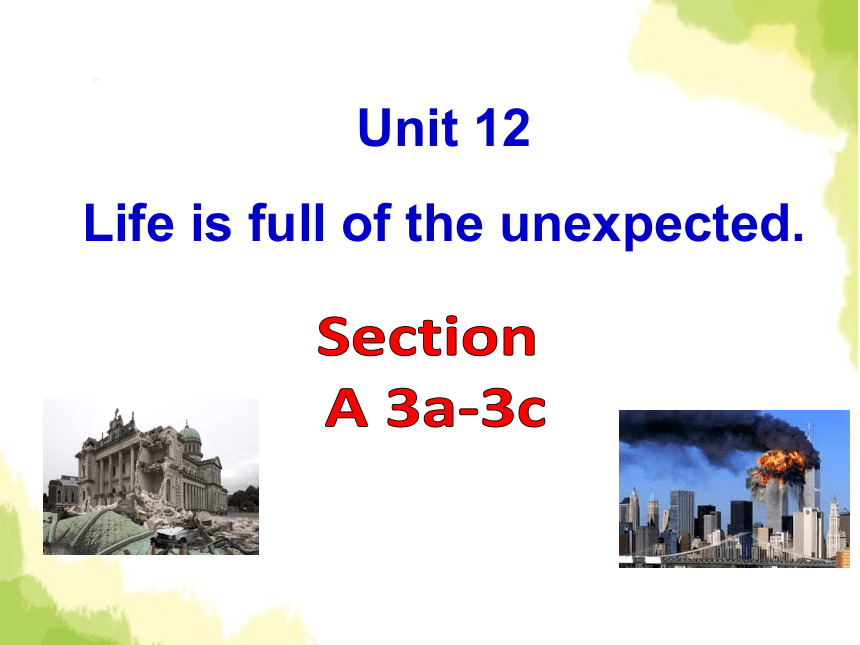 | |
| 格式 | zip | ||
| 文件大小 | 1.5MB | ||
| 资源类型 | 教案 | ||
| 版本资源 | 人教新目标(Go for it)版 | ||
| 科目 | 英语 | ||
| 更新时间 | 2021-12-22 23:33:08 | ||
图片预览

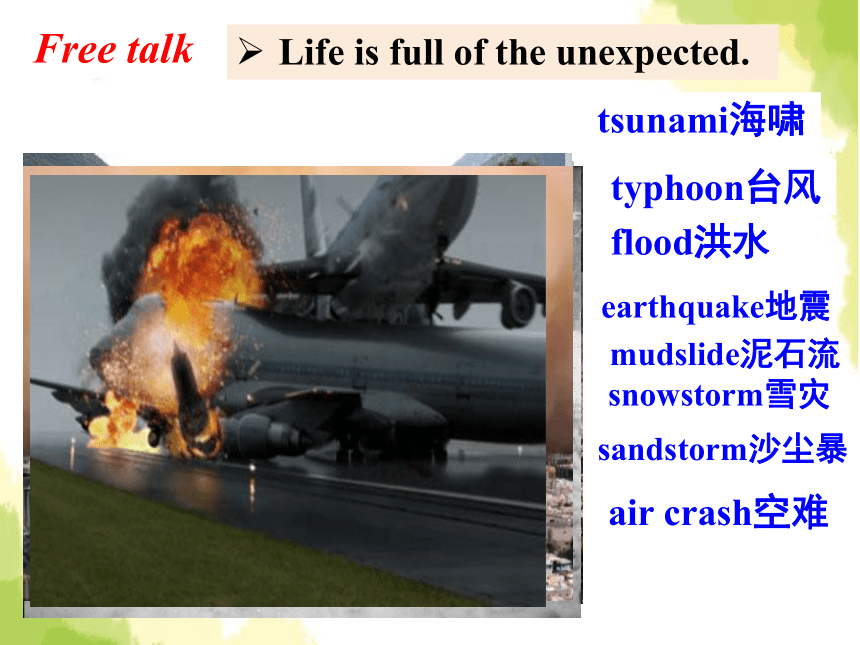
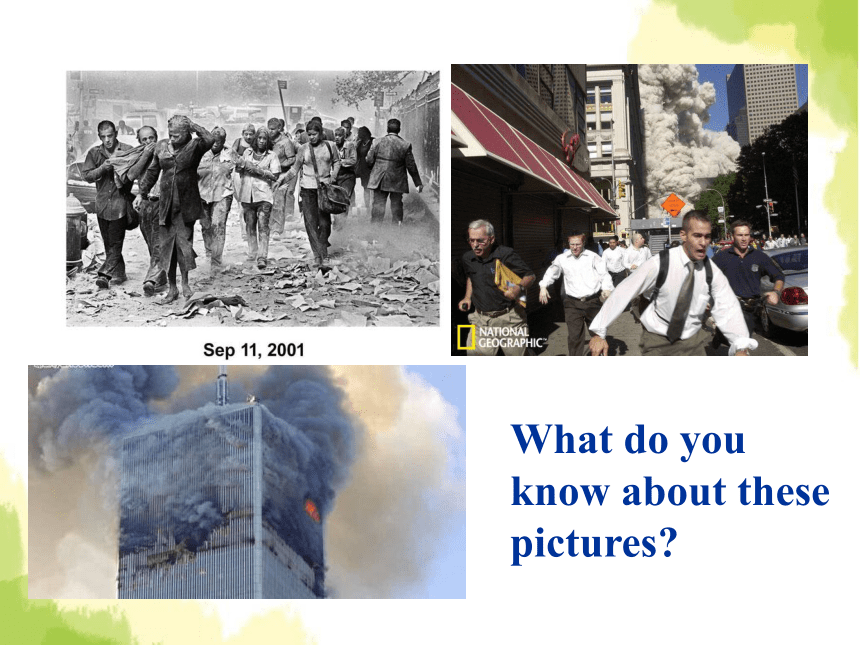

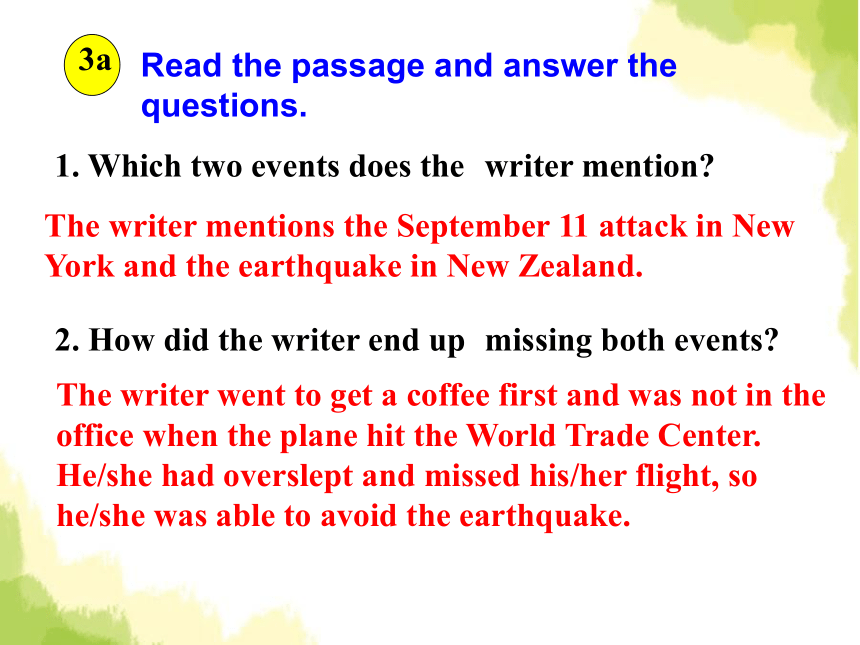
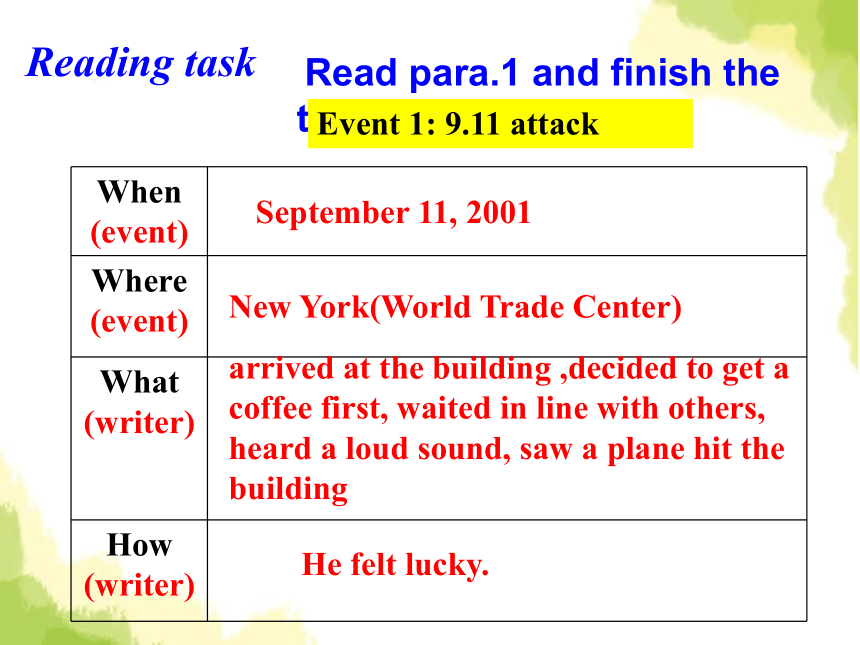
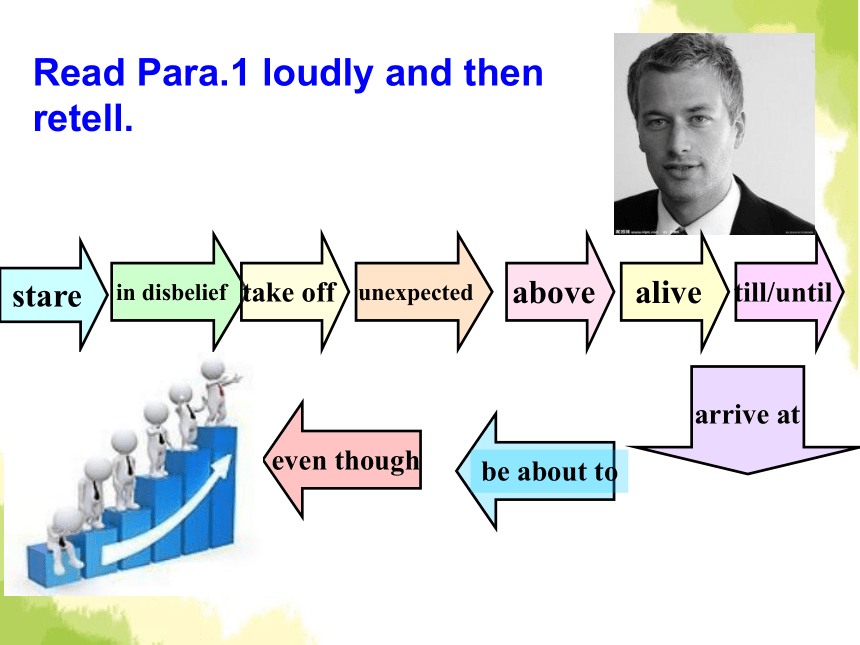
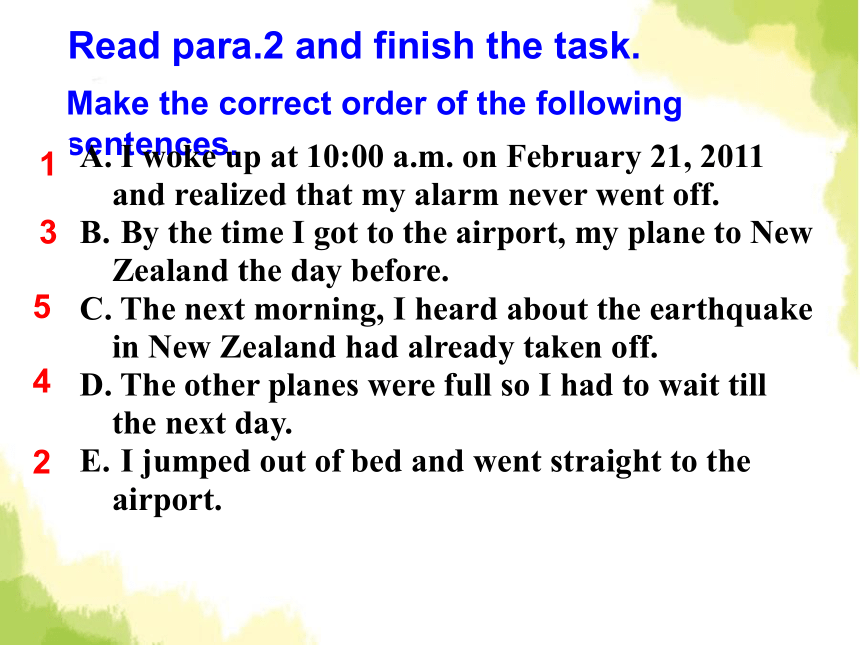
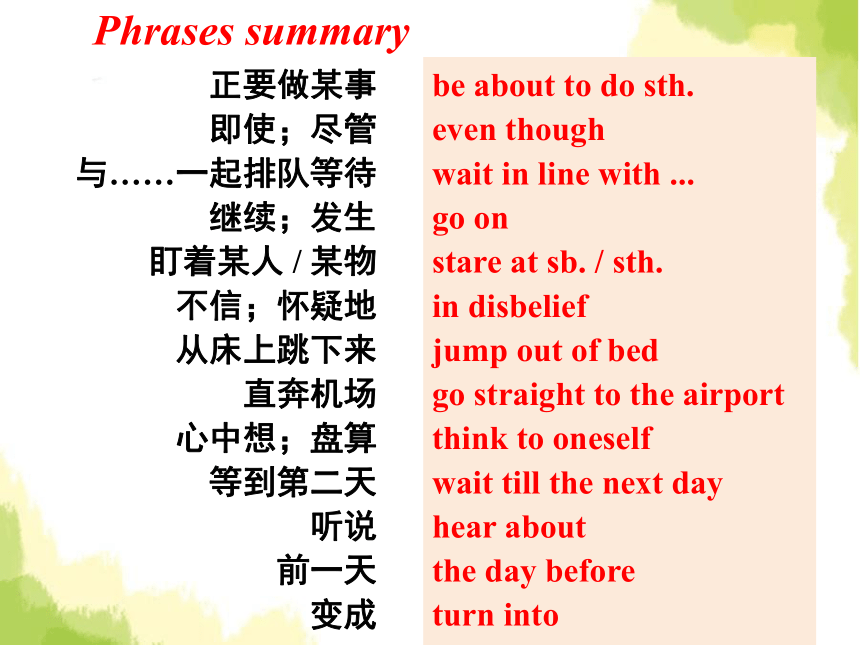
文档简介
(共27张PPT)
Unit 12
Life is full of the unexpected.
Section
A 3a-3c
Free talk
Life is full of the unexpected.
flood洪水
typhoon台风
earthquake地震
tsunami海啸
mudslide泥石流
snowstorm雪灾
sandstorm沙尘暴
air crash空难
What do you know about these pictures
How about these pictures
3a
Read the passage and answer the questions.
1. Which two events does the writer mention
The writer mentions the September 11 attack in New York and the earthquake in New Zealand.
2. How did the writer end up missing both events
The writer went to get a coffee first and was not in the office when the plane hit the World Trade Center. He/she had overslept and missed his/her flight, so he/she was able to avoid the earthquake.
Reading task
Read para.1 and finish the task.
Event 1: 9.11 attack
When (event)
Where (event)
What (writer)
How (writer)
September 11, 2001
New York(World Trade Center)
arrived at the building ,decided to get a coffee first, waited in line with others, heard a loud sound, saw a plane hit the building
He felt lucky.
stare
in disbelief
take off
unexpected
above
alive
till/until
arrive at
be about to
even though
Read Para.1 loudly and then retell.
Make the correct order of the following sentences.
I woke up at 10:00 a.m. on February 21, 2011 and realized that my alarm never went off.
By the time I got to the airport, my plane to New Zealand the day before.
The next morning, I heard about the earthquake in New Zealand had already taken off.
The other planes were full so I had to wait till the next day.
I jumped out of bed and went straight to the airport.
1
3
5
4
2
Read para.2 and finish the task.
正要做某事
即使;尽管
与……一起排队等待
继续;发生
盯着某人 / 某物
不信;怀疑地
从床上跳下来
直奔机场
心中想;盘算
等到第二天
听说
前一天
变成
be about to do sth.
even though
wait in line with ...
go on
stare at sb. / sth.
in disbelief
jump out of bed
go straight to the airport
think to oneself
wait till the next day
hear about
the day before
turn into
Phrases summary
3b
Find words from the passage with opposite meanings to the words below.
1. lost:
2. west:
3. below:
4. dead:
5. empty:
found
east
above
alive
full
adv. 向西,朝西
adj.向西的,西部的
n.西,西方
Then write a sentence with each word.
1. I found the money on the floor.
2. The sun rises in the east.
3. There was a large bird flying above us.
4. His family was so happy to hear he was still alive.
5. The train was so full that I couldn’t get on the train at all.
3c
Retell one of the events to your partner. Use these words and phrases to help you.
stare, in disbelief, take off, unexpected, burn, above, alive, till / until, arrive at, be about to, even though
e.g. On September 11, 2001, I arrived at my building in the morning and was about to enter the office building, when suddenly I decided to buy a coffee. The unexpected thing came about when I was waiting in the line that a plane crashed the office building where I work. People were staring at the burning plane in disbelief. How dangerous it was!
Paiwork
与你的同伴交流一下,你们经历过类似3a中提到的事情吗?哪些事情你曾经经历过?给你的同伴讲一下你的经历吧!可借助如下对话形式:
— Did something unexpected ever happen to you
— Yes!
— When did it happen
— It happened on February 21, 2013.
— What happened to you
— When I …
— How did you feel
— What did you learn from it
— …
Language points
Life is full of the unexpected. 生活充满了意外。
the unexpected 为名词化的形容词,意为
“出乎意料的事”。 英语中,有些形容词与定冠词the连用,表示一类人或事物,在句子中起名词的作用。
例:the homeless (无家可归者)
the disabled(残疾人)
the unwanted( 无人认领物品)
注意
当名词化的形容词用作主语时,谓语动词的单复数形式取决于它们所表示的概念的单复数情况。 多数情况下,表示一类人或物品时,谓语动词用复数;少数情况下,当指抽象概念或不可数的物品及事件时,谓语动词用单数。
例:The sick are always taken good care of in that hospital. 在那家医院里病人们总是受到很好的照顾。(the sick=the sick people)
(2) 这种结构中的形容词虽已名词化,但其语言
行为仍具有极强的形容词特征,受到副词修饰
或具有比较的特征。
例:The severely disabled need full-time care.重
度残疾人需要全天候拌护。
He is spoiled, and always asks for the most
expensive.
他被惯坏了,总是嚷着要最贵的东西。
(3) 名词化的形容词前面一般用定冠词the. 但
若由and链接(两形容词往往为反义词),
成对的使用时,又通常被省略。
例: He is popular with both young and old.
老老少少都喜欢他。
It is said that the man was widely
respected by both rich and poor.
据说那个人颇收人尊敬,无论是穷人还
是富人。
2. By the time I got up, my brother ______
already ______ in the shower. 我起床时,我弟弟已经进入浴室了。
“by the time”表示“当/到……时”,引导时间状语从句。如果从句中用了一般过去时,主语中常用过去完成时;如果主句中用了将来时,从句中常用一般现在时表将来。
例:By the time I got up, he had already left.
当我起床时,他已经离开了。
Language points
3. I was about to go up when I decided to get a coffee first.
be about to do sth.意为“刚要做某事,即将做某事。”表示即将发生的动作,在时间上指最近的将来。be about to do sth.通常不与具体的时间状语连用,而常与when引导的时间状语从句连用。
eg:I am about to go shopping this weekend.
我这个周末打算去购物。
The new school year is about to begin.
新学年开学在即。
I was about to go to school when it began to rain.
我正打算去学校,突然开始下雨了。
4.I felt lucky to be alive.
alive是形容词,侧重说明生与死之间的界限,既可指人,也可指物.可用来作表语,后置定语或宾补等。虽有死的可能,但还活着。
living 意为“活着的”,强调说明“尚在人间”,“健在”,可用来指人或物,作定语或表语。
live 意为“活的”,通常指物,不指人,常用作定语放在名词的前面。还指“实况转播的”。
lively 意为“活泼的”,“活跃热情的”,“充满活力的”,可作定语、表语或宾补,既可指人,又可指物。
5. We stared in disbelief at the black smoke rising above the burning building.
stare后常接介词at/into。v.“凝视,盯着”,指由于好奇、赞叹等原因而瞪大眼睛长时间地、直接地注视。
in disbelief 不相信 ,疑惑, 怀疑
above prep.
1)(表位置)在……正上方;高于”与 below相对。
2) 表示在地位/级别/能力/资历/重要性等方面“超过”、“在……之上”、“比……强”。
注意:on, over与above都可以表示“在……上”。
on表一物在另一物的表面上,两个物体相互接触
over表一物在另一物的垂直上方,两个物不接触,反义词为under;
above常笼统地表一物高于另一物体,反义词为below
Incident Date Place How did the writer end up missing both events
1
2
Summary
The World
Trade Center
was hit by
a plane
September
11,2001
In New
York
He decided to get a
coffee first from a
coffee place two
blocks away.
Earthquake
February
22,2011
In New
Zealand
He missed his plane
to New Zealand.
一、根据句意及首字母提示写单词,每空一词。
1.As we know,we should w in line no matter how many people there are.
2.The moon was a the trees in the east.
3.People do not know the value of health t they lose it.
4.The sun rises in the east and sets in the w .
5.If you travel by air,you must arrive at the a much earlier.
ait
bove
ill
est
irport
二、根据句意及汉语提示,完成句子,每空一词。
1.By the time Peter arrived at the airport,his plane had already . (起飞).
2.Bob looked at Julie (怀疑地).
3.What we have learned from teachers and books will .(转变成) our treasure in life.
taken
off
in
doubt/disbelief
turn
into
4.“What a boring Christmas!” Tina (心中想).
5.When you are waiting for the bus,you must .
(与其他人一起排队等待).
thought
to
herself
wait
in
line
with
the
others
三、根据汉语意思完成句子。
1. 当我到车站时,火车已经开走了。
____ ____ ____ I got to the station, the
train ____ ________ left.
2. 长大后,他会离开这儿。
He _____ _____ here by the time he ______ up.
3. 他捎我去车站。
He _____ ____ ____ ____ to the station.
By the time
had already
will leave
grows
gave me a lift
4. 有时,坏事可以变成好事。
A bad thing can be ______ _____ a good
one sometimes.
5. 你知道飞机什么时间起飞吗?
Do you know when the plane will ______
______
6. 房间里全是学生。
The room _____ _____ _____ students.
turned into
take
off
is full of
Unit 12
Life is full of the unexpected.
Section
A 3a-3c
Free talk
Life is full of the unexpected.
flood洪水
typhoon台风
earthquake地震
tsunami海啸
mudslide泥石流
snowstorm雪灾
sandstorm沙尘暴
air crash空难
What do you know about these pictures
How about these pictures
3a
Read the passage and answer the questions.
1. Which two events does the writer mention
The writer mentions the September 11 attack in New York and the earthquake in New Zealand.
2. How did the writer end up missing both events
The writer went to get a coffee first and was not in the office when the plane hit the World Trade Center. He/she had overslept and missed his/her flight, so he/she was able to avoid the earthquake.
Reading task
Read para.1 and finish the task.
Event 1: 9.11 attack
When (event)
Where (event)
What (writer)
How (writer)
September 11, 2001
New York(World Trade Center)
arrived at the building ,decided to get a coffee first, waited in line with others, heard a loud sound, saw a plane hit the building
He felt lucky.
stare
in disbelief
take off
unexpected
above
alive
till/until
arrive at
be about to
even though
Read Para.1 loudly and then retell.
Make the correct order of the following sentences.
I woke up at 10:00 a.m. on February 21, 2011 and realized that my alarm never went off.
By the time I got to the airport, my plane to New Zealand the day before.
The next morning, I heard about the earthquake in New Zealand had already taken off.
The other planes were full so I had to wait till the next day.
I jumped out of bed and went straight to the airport.
1
3
5
4
2
Read para.2 and finish the task.
正要做某事
即使;尽管
与……一起排队等待
继续;发生
盯着某人 / 某物
不信;怀疑地
从床上跳下来
直奔机场
心中想;盘算
等到第二天
听说
前一天
变成
be about to do sth.
even though
wait in line with ...
go on
stare at sb. / sth.
in disbelief
jump out of bed
go straight to the airport
think to oneself
wait till the next day
hear about
the day before
turn into
Phrases summary
3b
Find words from the passage with opposite meanings to the words below.
1. lost:
2. west:
3. below:
4. dead:
5. empty:
found
east
above
alive
full
adv. 向西,朝西
adj.向西的,西部的
n.西,西方
Then write a sentence with each word.
1. I found the money on the floor.
2. The sun rises in the east.
3. There was a large bird flying above us.
4. His family was so happy to hear he was still alive.
5. The train was so full that I couldn’t get on the train at all.
3c
Retell one of the events to your partner. Use these words and phrases to help you.
stare, in disbelief, take off, unexpected, burn, above, alive, till / until, arrive at, be about to, even though
e.g. On September 11, 2001, I arrived at my building in the morning and was about to enter the office building, when suddenly I decided to buy a coffee. The unexpected thing came about when I was waiting in the line that a plane crashed the office building where I work. People were staring at the burning plane in disbelief. How dangerous it was!
Paiwork
与你的同伴交流一下,你们经历过类似3a中提到的事情吗?哪些事情你曾经经历过?给你的同伴讲一下你的经历吧!可借助如下对话形式:
— Did something unexpected ever happen to you
— Yes!
— When did it happen
— It happened on February 21, 2013.
— What happened to you
— When I …
— How did you feel
— What did you learn from it
— …
Language points
Life is full of the unexpected. 生活充满了意外。
the unexpected 为名词化的形容词,意为
“出乎意料的事”。 英语中,有些形容词与定冠词the连用,表示一类人或事物,在句子中起名词的作用。
例:the homeless (无家可归者)
the disabled(残疾人)
the unwanted( 无人认领物品)
注意
当名词化的形容词用作主语时,谓语动词的单复数形式取决于它们所表示的概念的单复数情况。 多数情况下,表示一类人或物品时,谓语动词用复数;少数情况下,当指抽象概念或不可数的物品及事件时,谓语动词用单数。
例:The sick are always taken good care of in that hospital. 在那家医院里病人们总是受到很好的照顾。(the sick=the sick people)
(2) 这种结构中的形容词虽已名词化,但其语言
行为仍具有极强的形容词特征,受到副词修饰
或具有比较的特征。
例:The severely disabled need full-time care.重
度残疾人需要全天候拌护。
He is spoiled, and always asks for the most
expensive.
他被惯坏了,总是嚷着要最贵的东西。
(3) 名词化的形容词前面一般用定冠词the. 但
若由and链接(两形容词往往为反义词),
成对的使用时,又通常被省略。
例: He is popular with both young and old.
老老少少都喜欢他。
It is said that the man was widely
respected by both rich and poor.
据说那个人颇收人尊敬,无论是穷人还
是富人。
2. By the time I got up, my brother ______
already ______ in the shower. 我起床时,我弟弟已经进入浴室了。
“by the time”表示“当/到……时”,引导时间状语从句。如果从句中用了一般过去时,主语中常用过去完成时;如果主句中用了将来时,从句中常用一般现在时表将来。
例:By the time I got up, he had already left.
当我起床时,他已经离开了。
Language points
3. I was about to go up when I decided to get a coffee first.
be about to do sth.意为“刚要做某事,即将做某事。”表示即将发生的动作,在时间上指最近的将来。be about to do sth.通常不与具体的时间状语连用,而常与when引导的时间状语从句连用。
eg:I am about to go shopping this weekend.
我这个周末打算去购物。
The new school year is about to begin.
新学年开学在即。
I was about to go to school when it began to rain.
我正打算去学校,突然开始下雨了。
4.I felt lucky to be alive.
alive是形容词,侧重说明生与死之间的界限,既可指人,也可指物.可用来作表语,后置定语或宾补等。虽有死的可能,但还活着。
living 意为“活着的”,强调说明“尚在人间”,“健在”,可用来指人或物,作定语或表语。
live 意为“活的”,通常指物,不指人,常用作定语放在名词的前面。还指“实况转播的”。
lively 意为“活泼的”,“活跃热情的”,“充满活力的”,可作定语、表语或宾补,既可指人,又可指物。
5. We stared in disbelief at the black smoke rising above the burning building.
stare后常接介词at/into。v.“凝视,盯着”,指由于好奇、赞叹等原因而瞪大眼睛长时间地、直接地注视。
in disbelief 不相信 ,疑惑, 怀疑
above prep.
1)(表位置)在……正上方;高于”与 below相对。
2) 表示在地位/级别/能力/资历/重要性等方面“超过”、“在……之上”、“比……强”。
注意:on, over与above都可以表示“在……上”。
on表一物在另一物的表面上,两个物体相互接触
over表一物在另一物的垂直上方,两个物不接触,反义词为under;
above常笼统地表一物高于另一物体,反义词为below
Incident Date Place How did the writer end up missing both events
1
2
Summary
The World
Trade Center
was hit by
a plane
September
11,2001
In New
York
He decided to get a
coffee first from a
coffee place two
blocks away.
Earthquake
February
22,2011
In New
Zealand
He missed his plane
to New Zealand.
一、根据句意及首字母提示写单词,每空一词。
1.As we know,we should w in line no matter how many people there are.
2.The moon was a the trees in the east.
3.People do not know the value of health t they lose it.
4.The sun rises in the east and sets in the w .
5.If you travel by air,you must arrive at the a much earlier.
ait
bove
ill
est
irport
二、根据句意及汉语提示,完成句子,每空一词。
1.By the time Peter arrived at the airport,his plane had already . (起飞).
2.Bob looked at Julie (怀疑地).
3.What we have learned from teachers and books will .(转变成) our treasure in life.
taken
off
in
doubt/disbelief
turn
into
4.“What a boring Christmas!” Tina (心中想).
5.When you are waiting for the bus,you must .
(与其他人一起排队等待).
thought
to
herself
wait
in
line
with
the
others
三、根据汉语意思完成句子。
1. 当我到车站时,火车已经开走了。
____ ____ ____ I got to the station, the
train ____ ________ left.
2. 长大后,他会离开这儿。
He _____ _____ here by the time he ______ up.
3. 他捎我去车站。
He _____ ____ ____ ____ to the station.
By the time
had already
will leave
grows
gave me a lift
4. 有时,坏事可以变成好事。
A bad thing can be ______ _____ a good
one sometimes.
5. 你知道飞机什么时间起飞吗?
Do you know when the plane will ______
______
6. 房间里全是学生。
The room _____ _____ _____ students.
turned into
take
off
is full of
同课章节目录
- Unit 1 How can we become good learners.
- Section A
- Section B
- Unit 2 I think that mooncakes are delicious!
- Section A
- Section B
- Unit 3 Could you please tell me where the restroom
- Section A
- Section B
- Unit 4 I used to be afraid of the dark.
- Section A
- Section B
- Unit 5 What are the shirts made of?
- Section A
- Section B
- Review of Units 1-5
- Unit 6 When was it invented?
- Section A
- Section B
- Unit 7 Teenagers should be allowed to choose their
- Section A
- Section B
- Unit 8 It must belong to Carla.
- Section A
- Section B
- Unit 9 I like music that I can dance to.
- Section A
- Section B
- Unit 10 You're supposed to shake hands.
- Section A
- Section B
- Review of Units 6-10
- Unit 11 Sad movies make me cry.
- Section A
- Section B
- Unit 12 Life is full of the unexpected
- Section A
- Section B
- Unit 13 We're trying to save the earth!
- Section A
- Section B
- Unit 14 I remember meeting all of you in Grade 7.
- Section A
- Section B
- Review of Units 11-14
